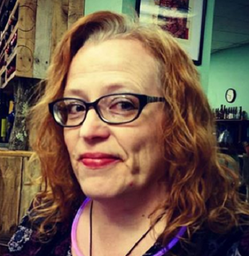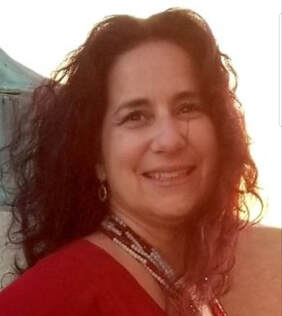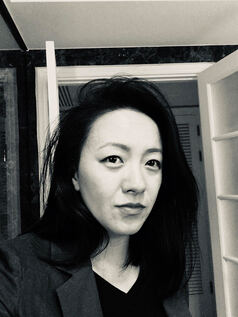By Henri Brink “We were thirteen. Soon after, we took the cardboard box holding Nana’s ashes to the Highway 50 overpass and opened it, watching her bits and pieces dance in the powerful wake of passing eighteen wheelers. Then, we went home and crafted a plan. And waited.” – Beth Anderson, “Patience” For her contribution to Furious Gravity, Beth Anderson delivers a gripping story about loss, violence and the ways family protects and harms us. Told in dual first person, “Patience” is an incredible piece of flash fiction that somehow manages to span a moment and a lifetime, and it opens the anthology with a poignant elegance that I, for one, couldn’t get out of my head. Thoroughly starstruck, I recently got the chance to talk with Beth about her stories, her community, and the process of writing "Patience."
5 Comments
By Jason Brandon Colleen Kearney Rich’s “The Other Gorgon Girl” shifts the popular focus from Medusa to her sister Euryale, the god of war. In this short story, mythology is married to a modern scenario. Euryale, fed up with the account manager and his mansplaining, gives him a look that leaves him petrified. But how does one dispose of his petrified body in this surveillance state? Won’t cameras catch her and her boyfriend getting rid of the body? While this isn’t a bloody murder, the account manager cannot escape his state of petrification and be resucitated. Euryale defeats the evil, but cannot escape the consequences. In this interview, Colleen Kearney Rich and I discuss the origin of this piece, her affinity for the short form, and how she has advised and uplifted other writers. By Emily Park  In A January Migration, J.J. Kent narrates a cold night in New York City and a tense dinner conversation with her partner. The story follows them on the walk home, their voices rattling through the winter air over the crunch of slushy sidewalks beneath their shoes. Intertwined in the narrative are moments of relatability and imagery that articulate the subtle, fleeting moments of pain and pleasure that come with human relationships. Local to Maryland, Kent is seizing the moment to write! She is a writer currently working on her first book, a retelling of her hilarious and adventurous childhood. I had the pleasure of discussing her journey as a writer and her story A January Migration. by Kalin Lamme Why is writing important to you? I’ve always written to process life and to make sense of things, like the death of loved ones, experiences I’ve had, and choices I haven’t made. I get to create characters who are messier than me and learn about myself and the human condition from them. It’s a creative outlet that makes me feel alive. By Kira Bunkholt  “I grew up saying, even if you're an actor, your role ends at some point, like, the play or the show or the movie is going to end, and you have to take your costume off. But why would you bother walking around in a costume? So I try to use this thinking in fiction and nonfiction, you know, the sense of not being afraid of these differences, but really just embracing and accepting yourself and others.” - Vonetta Young As a memoirist, essayist, and short storyist, Vonetta Young creates space for herself by leaning into contradictions instead of masking them, or putting on a costume. In her work, she explores complex family dynamics, Millennial perspectives on Christianity, the relationship between wealth and blackness, or what she calls “the messy intersection of race and class in upwardly mobile Black families.” And, most importantly, she looks at how all of these matters relate to identity and belonging. Adding to Young’s long list of publications, this issue of Grace & Gravity features Young’s short story, “Sand and Salt” in which her main character, Selma, struggles to maintain close connections with her family after achieving a wealthier status, illustrating the alienation many low-income black people face as they gain education and, in turn, more financial resources. After reading her short story, I had the wonderful opportunity to interview her about her writing journey, the contradictory aspects of identity, deconstructing the view of blackness as a monolith, and her newer role as an editor for both the Rumpus and The Offing. by demory hobbs Heather Davis balances writing poetry, fiction, and non-fiction with working full-time, being a wife, being a mother, and being a person who needs some sleep occasionally. Her book of poems The Lost Tribe of Us won the Main Street Rag Poetry Book Award. She has poems forthcoming in Gargoyle, Northern Virginia Review, and Fledgling Rag. For Furious Gravity, Heather has written a non-fiction essay “Be the Ocean: Everyday Lessons in Rage.” The piece explores parenting a neurodiverse child and how much parents can learn from their children. It’s a must-read for anyone who, like me, admires a writer who can bring the reader into her world in a way that is authentic and empathetic. I had the opportunity to interview Heather about the piece, her writing practice, and all of the sweet surprises life brings. By Narendra Desirazu Wendy Goodman is a writer, and a trademark attorney by day. While she has been writing through her legal career spanning over 20 years, all that writing was mostly for her professional work—legal briefs, legal arguments and so on; it wasn’t writing “from the soul.” Over the last couple of years, she started writing personal essays. She felt that she wanted to write about things emotionally: write how she felt. Wendy signed up for a writing workshop at The Writer’s Center in Bethesda. Although she had started writing creatively even before joining the workshop group, her workshop cohort helped her improve her writing by critiquing her work and offering extensive feedback. Getting feedback from professional writers helped her gain confidence in her work and she started sending out her writing to journals. Initially, she had many rejects, which we will talk about this later in her interview, but slowly she also has had some successes. Wendy had a non-fiction piece, “How A Meeting With Philip Roth Brought Me Closer To My Father,” published in the online journal Hevria.com, a second non-fiction piece “The Reynolds Pamphlet” published in the print journal, Ocotilla Review, and a fiction piece, “Chevy Chase Club,” was selected as a runner up in a contest held by Two Sisters Writing & Publishing. She is going to have her non-fiction work “The Toupee” published in the DC Women’s Anthology, Furious Gravity. Adhering to the social distancing conventions of these times of coronavirus, I interviewed Wendy over the phone. Here is the interview. By Esteban Bachelet  Tara Campbell grew up in a unique household with a mix of TV, laughter, and good humor. This wacky childhood would go on to spark an imaginative career as writer interested in cross-genre and speculative fiction. Appearing in various journals, the stories remain fresh and imaginative. I spoke to Tara not only to gain deeper insight into “Barry Knows Best” but also to talk about how she makes the speculative magic in her work come to life. By Mae Zhang McCauley  From movies, to politics, literature, pop culture, philosophy and more, the West has always been fascinated with “the East” and more specifically—China. It’s a form of Orientalism in itself that is able to co-opt people’s lived experiences and own histories. In Daien Guo’s nonfiction essay, “The China Expert,” readers are introduced to Guo’s China: “My China is the world of a young child; it exists only in my memories and in the memories of those who were with me, who cared for me.” Daien immigrated from China to the United States when she was seven years old and in the past, she has written both “China” themed pieces and “non-China” pieces. However, it is her China pieces that seem to gain more traction, because as Daien notes, “America, and the West, has always been fascinated by China.” Daien stresses that she is self-conscious about “not pandering to the West’s ‘China fascination’ in her pieces.” Whenever she writes about something that is China-related, Daien tries to ensure that “it’s authentic to me and my voice—that it’s not sentimental or cloying, or playing up to something that people expect.” “The China Expert” illustrates Daien’s vivid childhood memories in 1980s southwest China and how they reclaim what China means to her in the present. I had the opportunity to discuss the important role of memory in this process, parenting, pen names (and more!) with Daien. by Matt Leistra Jessie Rothwell is many things. She’s a former resident of Los Angeles, and a former and current resident of Washington DC. She’s currently a teacher, and it’s one the few jobs she’s had that pays her to do something she cares about. For that reason, she doesn’t let how she makes money define her. “It’s such a big thing in DC and LA,” she says. “The first thing out of someone’s mouth is ‘what you do you do?’ and I’ve tried to start flipping it on its head by saying that I do yard work, I do crossword puzzles, I do art and crafts. Two of the artistic mediums she’s most drawn to are music and writing. Her piece “Salvation” by Black Rebel Motorcycle Club blends both into an immersive experience that transports the reader to a Hollywood hilltop just before dawn. Salvation is one of nearly 20 pieces Rothwell has written that draw their inspiration from songs. Rather than writing about the songs themselves, however, she describes what was happening in her life when she listened to them: “It’s a way for me to take these songs that have been important to me and helped me in some moments and turn them into a different kind of art.” In Salvation, an energizing, second-person narrative invites the reader to spend the night crammed in the back of Rothwell’s car, yearning for sleep as they seek refuge from a bedbug-infested hotel on the streets of her old neighborhood. The raw, stream-of-consciousness-style piece ends with the chorus of the song Salvation and a command to the reader, one that weighs far heavier than a few drops of ink in the era of Coronavirus: “Do you feel alive? Can you feel alive? And you wonder.” I spoke to Rothwell about her love of music, BRMC (as true fans of the band refer to them) and the current Coronavirus pandemic. Below is an edited transcript of our conversation: |
Archives
May 2020
Categories |

 RSS Feed
RSS Feed